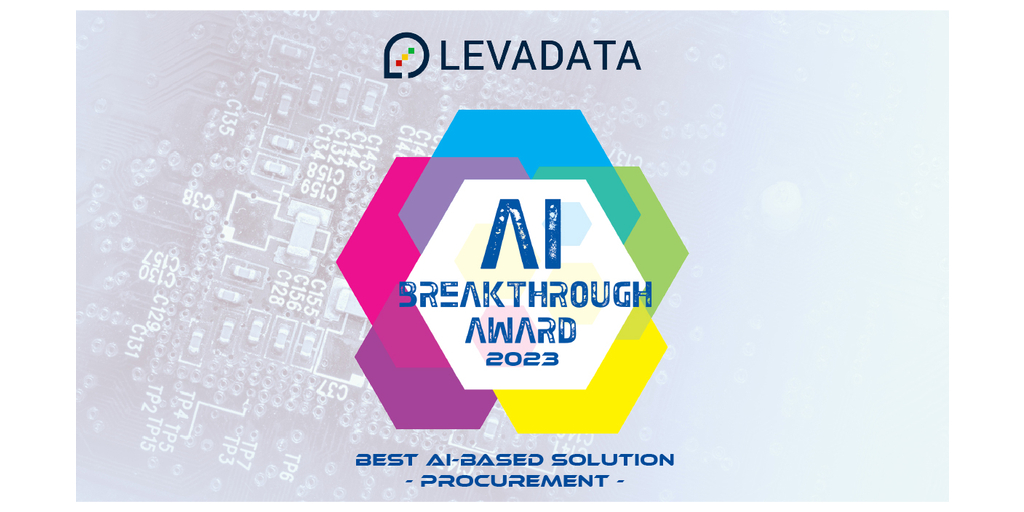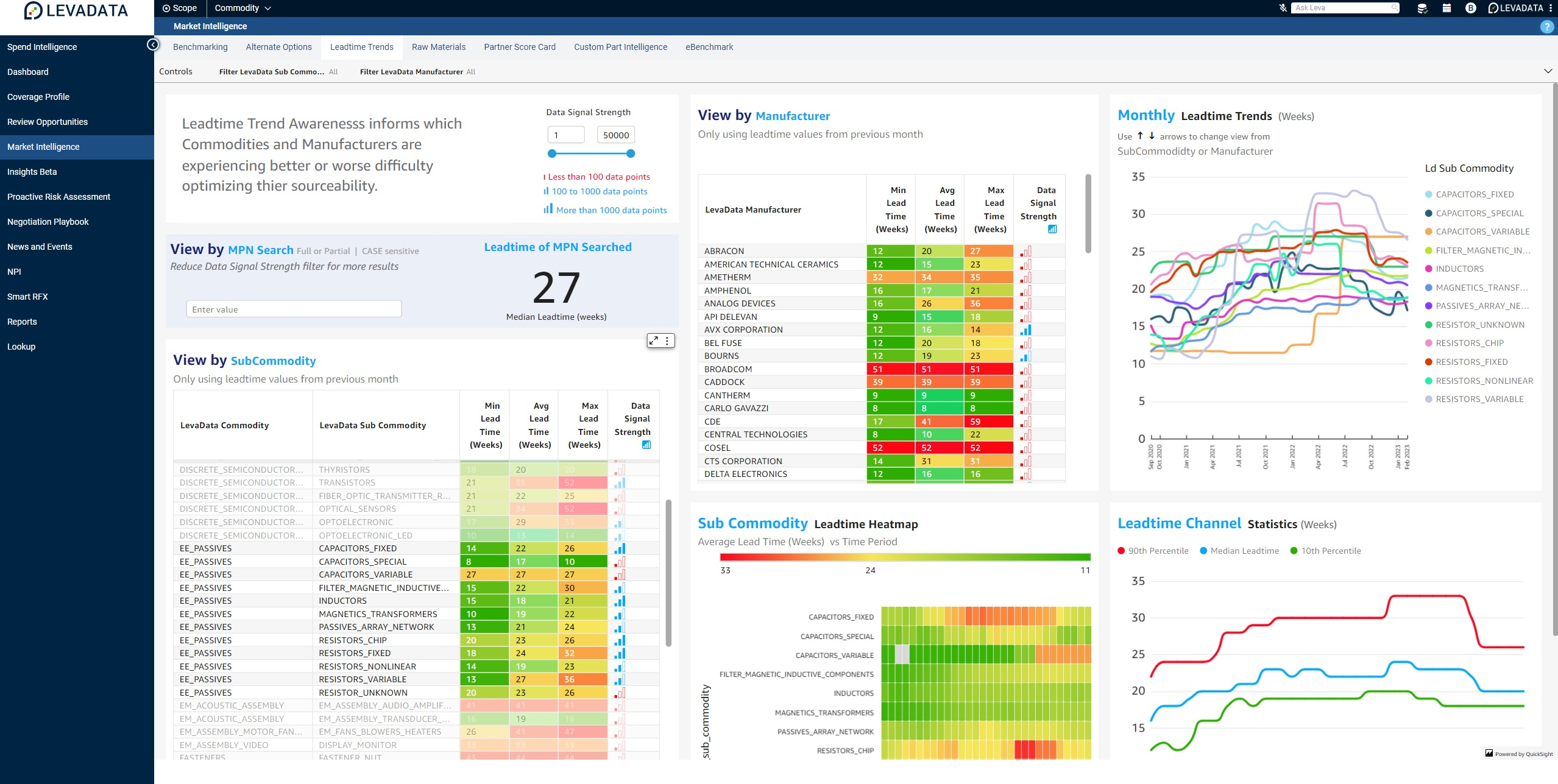
LevaData: Complete Buyer's Guide
Transforming complex supply chain sourcing through cognitive analytics and autonomous workflow automation.
LevaData is an enterprise-focused AI procurement platform that transforms complex supply chain sourcing through cognitive analytics and autonomous workflow automation. It positions itself as a specialized cognitive sourcing solution that goes beyond traditional procurement automation by analyzing procurement variables at the Bill of Materials (BOM) level using their proprietary Large Sourcing Model (LSM)[61].
Market Position & Maturity
Market Standing
LevaData operates in the premium enterprise procurement technology segment, competing directly with established players like Keelvar in RFQ automation and Veridion in supplier discovery[61][72].
Company Maturity
LevaData targets enterprises in electronics, manufacturing, and retail sectors with complex direct material sourcing needs[61][70].
Growth Trajectory
The company is investing in emerging capabilities including blockchain-integrated supplier compliance tracking and generative AI for contract synthesis[61][65].
Industry Recognition
Gartner named LevaData a 'Sample Vendor' in its 2022 Hype Cycle for Procurement for autonomous sourcing and prescriptive analytics[72].
Strategic Partnerships
Focus on integration with major ERP platforms, though the platform requires significant technical resources for deployment despite pre-built connectors[61][72].
Longevity Assessment
LevaData's innovation focus positions it as a forward-looking choice for organizations prioritizing cutting-edge capabilities over proven market leadership, though it also indicates ongoing platform evolution rather than mature stability.
Proof of Capabilities
Customer Evidence
A $5B global manufacturer leveraged LevaData's spend intelligence platform to identify pricing discrepancies across suppliers, achieving $14M in cost savings within 12 months of implementation[60].
Quantified Outcomes
The same customer improved cost benchmarking visibility by 40%, enabling data-driven negotiations and strategic supplier relationship management[58][62].
Case Study Analysis
One electronics manufacturer reported 30% faster RFQ processing after automating supplier scoring through LevaData's cognitive analytics platform[61][72].
Market Validation
Gartner recognition as a 'Sample Vendor' in its 2022 Hype Cycle for Procurement for autonomous sourcing and prescriptive analytics capabilities[72].
Reference Customers
Primary adopters include global manufacturers in electronics, automotive, and mid-market retailers with complex sourcing needs[60][69].
AI Technology
LevaData's agentic AI architecture represents a sophisticated approach to procurement automation that goes beyond traditional rule-based systems. The platform's core technology centers on cognitive sourcing bots that analyze procurement variables at the Bill of Materials (BOM) level, utilizing a proprietary Large Sourcing Model (LSM)[61][65].
Architecture
Integration architecture supports pre-built connectors for major ERP systems including SAP and NetSuite, though substantial technical resources remain necessary for data mapping, customization, and legacy system compatibility[61][72].
Primary Competitors
Established players like Keelvar in RFQ automation and Veridion in supplier discovery[61][72].
Competitive Advantages
Cognitive sourcing bots that analyze procurement variables at granular component levels rather than broad assessments, creating competitive advantages in predictive sourcing scenarios[61][65].
Market Positioning
LevaData competes in the premium enterprise segment against established players, with innovation trajectory including blockchain-integrated supplier compliance tracking and generative AI for contract synthesis[61][65].
Win/Loss Scenarios
Win scenarios favor LevaData for enterprises with complex global supply chains requiring sophisticated risk analysis and cost optimization, while alternatives may be preferable for organizations prioritizing rapid deployment, lower implementation costs, or specialized functionality[61][70][72].
Key Features

Pros & Cons
Use Cases
Integrations
Pricing
Featured In Articles
Comprehensive analysis of Product Sourcing for Ecommerce for Ecommerce businesses and online retailers. Expert evaluation of features, pricing, and implementation.
How We Researched This Guide
About This Guide: This comprehensive analysis is based on extensive competitive intelligence and real-world implementation data from leading AI vendors. StayModern updates this guide quarterly to reflect market developments and vendor performance changes.
72+ verified sources per analysis including official documentation, customer reviews, analyst reports, and industry publications.
- • Vendor documentation & whitepapers
- • Customer testimonials & case studies
- • Third-party analyst assessments
- • Industry benchmarking reports
Standardized assessment framework across 8 key dimensions for objective comparison.
- • Technology capabilities & architecture
- • Market position & customer evidence
- • Implementation experience & support
- • Pricing value & competitive position
Research is refreshed every 90 days to capture market changes and new vendor capabilities.
- • New product releases & features
- • Market positioning changes
- • Customer feedback integration
- • Competitive landscape shifts
Every claim is source-linked with direct citations to original materials for verification.
- • Clickable citation links
- • Original source attribution
- • Date stamps for currency
- • Quality score validation
Analysis follows systematic research protocols with consistent evaluation frameworks.
- • Standardized assessment criteria
- • Multi-source verification process
- • Consistent evaluation methodology
- • Quality assurance protocols
Buyer-focused analysis with transparent methodology and factual accuracy commitment.
- • Objective comparative analysis
- • Transparent research methodology
- • Factual accuracy commitment
- • Continuous quality improvement
Quality Commitment: If you find any inaccuracies in our analysis on this page, please contact us at research@staymodern.ai. We're committed to maintaining the highest standards of research integrity and will investigate and correct any issues promptly.